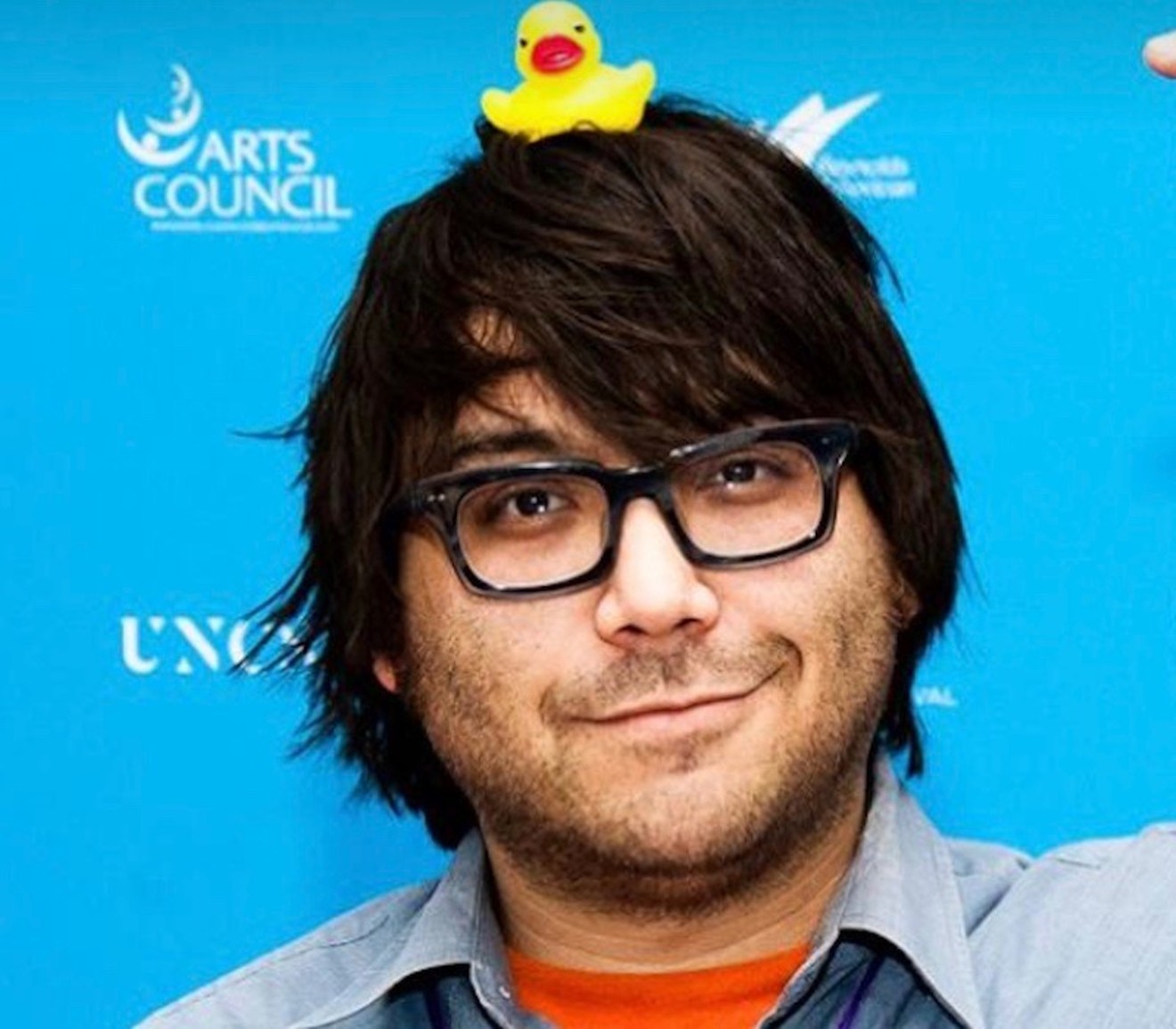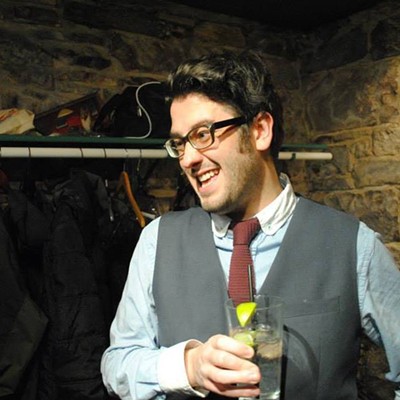So many Denver creatives have embraced the medium of podcasting that you have a seemingly endless supply of stories and perspectives available for your listening pleasure. Podcast Profiles is here to help you navigate the crowded waters of this growing pool of podcasts.
Grab your earbuds and get ready to embark on an audio voyage of discovery with American Filmmaker. Hosted and produced by filmmaker, academic and podcaster Josh Hyde, the show features in-depth interviews with figures from all over the media landscape, including journalists, comedians, composers and tai chi experts.
Westword recently caught up with Hyde via email to discuss the differences between podcasting and producing films, the creative benefits of tai chi, and why American Filmmaker is a one-man show — for now.
Westword: Can you tell us the origin story behind American Filmmaker?
Josh Hyde: I'm a working filmmaker, and I’ve become fascinated with the creative journey. At first the podcast was creative therapy to do in between work and film projects to try and document the guests' creative journey to find helpful tips to pass on to other filmmakers, storytellers and creatives. Now the podcast has evolved into a discovery of the creativity of the human spirit of each guest and their projects.
I record and edit each episode because it feels more personal and honest to me, like I’m making an audio documentary from the interview. Also, the filmmaker in me has to dialogue-edit the guests' answers to increase the impact of their words and remove anything repeated so the listeners can flow through the information. I’m recording more and am looking for more help to edit the podcast episodes. As a filmmaker, I’ve recorded a lot of documentary interviews, so I’m comfortable with that end of the production work. At first I was curious if there was a way to document the creative journey of filmmakers, and then I realized it was larger than just filmmakers. It was creativity itself. So, I started including storytellers of all kinds, from photographers to comic-book artists, film editors, journalists, indie book publishers, cinematographers, writers, composers and producers.
What was your creative background before you decided to get into podcasting?
I’m a freelance filmmaker and editor. I started publishing my screenplays, and I really enjoy that as an outlet. A lot of projects as a filmmaker, from writing to finishing a film, take time. I’ve gotten really good at achieving long-term goals, but I wanted to be able to work on something that I can do daily and weekly. And so the podcasts seemed to be a good idea. Thinking of what the podcast would actually be was the hard part. It took me a year to think of the right idea, and it was right in front of me the whole time. I realized that I could only do a podcast about things I really cared about; otherwise, I wasn’t going to be able to follow through on the idea. The important things surfaced in my love of the creative process, the long road of filmmaking, really fine teas (because they keep the mind healthy and ready to create), and tai chi.
What qualities do you think make podcasting such a unique medium? Would you say that there are more or fewer barriers than getting into filmmaking?
As a filmmaker, you go through a lot to finish and distribute your movies. I’ve structured a lot of life decisions on trying to make the current project and the next project. And I’ve had to expand my view to really enjoy the creative process. At the same time, I think there is a lot of illusion in the entertainment industry, and this shapes a version of the creative process. The creative process has so many colors and shades. It’s expansive and pushes humans to the end of their abilities to create something they believe in, and I’m curious about the spectrum of creativity and the healthiest way to be creative.
I was lucky enough to have a handful of creative mentors who served as good examples for how films got made and distributed internationally. I was able to watch them work, day in and day out, putting themselves through a creative process that creates a movie. There’s a creative energy that comes through the filmmakers as the film is made. Over time, I realized the creative process and why people go through it to create was interesting and needs to be talked about to shed more light on the process and the creators behind the works. Sometimes I wonder if the creative people are more valuable than the final work produced.
Which three episodes would you recommend for new listeners just getting into the show?
There are a lot of good episodes for creative people trying to make their next project, learn about how movies are made, or just learn what media professionals go through to bring the stories to audiences.
Episode four, with composer Michael J. Deller, is a good one. Mike is the keyboard player in the Budos Band and Charles Bradley and His Extraordinaires. He’s also a longtime collaborator on soundtracks for Postales, My Friend’s Rubber Ducky and the documentary American Hemp, which we just released on Amazon Prime and other streaming portals. Readers should also check out episode six, with Chris Lett. He's a former CNN news producer and journalist who talks about close to a decade of working his way up the ranks at CNN to report on the Black Lives Matter movement, the Pulse nightclub shooting, the Muhammad drawing contest in Garland, Texas, and the San Bernardino terrorist shooting. Another good one is episode 24, with Marie Cheng. She's a writer and filmmaker who talks about studying at Chapman’s film school and working her way up to work on animated Dreamwork series like The Adventures of Puss in Boots and Harvey Girls Forever! I could probably even name three more.
Do you think of your show as entertainment, or as an instructional guide for aspiring filmmakers? It can also be both!
I think it’s both. The entertaining part of the podcasts is you can listen to the people who created the films, comic books, photography books, novels, novellas, news stories and music, and then you can go and watch, read and listen to the final film, soundtrack, movie, novel, comic book or photograph. I think it’s important to know what kind of creativity exists and the journey to create the work. The more educational part is to learn about the creative process, how people learn their process and practice it, and where it leads them. I think by listening to each guest, you can demystify the creative journey.
You've had a wide array of guests on your show — everyone from documentarians and comedians to tai chi practitioners. How have these varying perspectives informed the trajectory of the podcast?
I need perspective in my life to help me understand what’s around me and how to look at it. I think the variety of guests is to help create a larger perspective than what we normally experience in our day-to-day life. Each episode tries to distill a five- or a fifty-year journey down to the projects produced over the years.
What are your creative and professional endeavors beyond hosting the podcast?
My hope is to continue making films, writing scripts, podcasting and doing my freelance work. I enjoy the podcast as an extension of the filmmaking process, and helping to maintain the larger culture of cinema for film lovers and filmmakers. Every episode makes me realize that it’s becoming an audio archive of storytelling and creativity. We just recorded the first international filmmaker from Brazil, who's making his first feature film. His film is controversial because it was financed by the previous Brazilian government’s film council, and now the current Brazilian president is trying to shut down the film council. This is a powerful episode because it combines the journey of the filmmaker with the current social political reality of the world trying to censor filmmakers.
Do you have editors and producers for American Filmmaker, or is it essentially a one-man show?
The podcast started about six to eight months ago, and it’s growing. It has a personal edge to it because I record and edit the episodes. I feel like each episode is like a film in that it needs to be edited to take out extra information and create story flow out of the conversation. I’ve got interns who help with my freelance work, but I’m trying to build out the podcasting team with the right people. I think the American Filmmaker podcasts can be around for a long time, if I find the right people who love creativity, storytelling and the process.
Do you have any other projects you'd like to plug here?
I just released a documentary, American Hemp, and I published a couple of screenplays this year, How to Kill a Bad Man and Los Espiritus. The podcast is something that I can do daily and weekly, while I work on these longer projects that can take anywhere from one to four years to complete.
[
{
"name": "Air - MediumRectangle - Inline Content - Mobile Display Size",
"component": "12017618",
"insertPoint": "2",
"requiredCountToDisplay": "2"
},{
"name": "Editor Picks",
"component": "17242653",
"insertPoint": "4",
"requiredCountToDisplay": "1"
},{
"name": "Inline Links",
"component": "18838239",
"insertPoint": "8th",
"startingPoint": 8,
"requiredCountToDisplay": "7",
"maxInsertions": 25
},{
"name": "Air - MediumRectangle - Combo - Inline Content",
"component": "17261320",
"insertPoint": "8th",
"startingPoint": 8,
"requiredCountToDisplay": "7",
"maxInsertions": 25
},{
"name": "Inline Links",
"component": "18838239",
"insertPoint": "8th",
"startingPoint": 12,
"requiredCountToDisplay": "11",
"maxInsertions": 25
},{
"name": "Air - Leaderboard Tower - Combo - Inline Content",
"component": "17261321",
"insertPoint": "8th",
"startingPoint": 12,
"requiredCountToDisplay": "11",
"maxInsertions": 25
}
]













